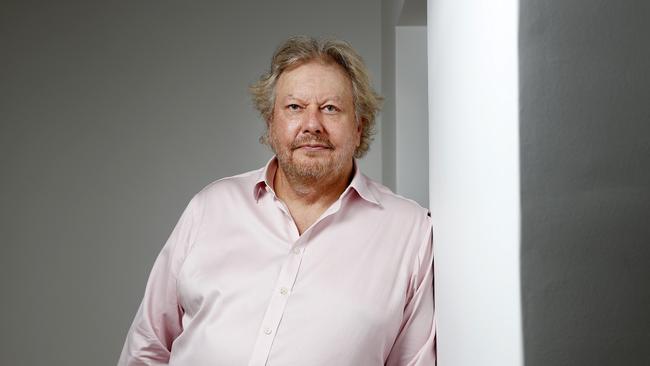Education reforms are needed to prepare our future workers in the tech sector, says Richard White
The education system needs an overhaul to ensure Australia stays at the front of the pack with technologically advanced graduates, Richard White tells the 2024 CEO Survey.

How is inflation and the prospect of higher for longer interest rates affecting your business? Importantly, is the behaviour of your customers changing?
For WiseTech, we’re fortunate our growth opportunity is not reliant on market growth which could be impacted by continuing rate rises. The bulk of our growth is from customer wins and expansion of our product offering, and we see this continuing.
Our solutions drive efficiencies in international cargo logistics so they resonate with customers in both growing and contracting economies.
In a buoyant economy, our customers get value from our CargoWise product to manage high volumes of trade. Whereas in a challenging economy, our customers adopt our technology to drive efficiencies and enhance productivity, while maintaining their customer service obligations. This makes our business resilient through the economic cycle.
How would you rate the shape of the Australian economy as we head into the New Year?
We’ve seen the tight technology talent market ease significantly this year, which has substantially increased the number of inbound employment applicants. We receive thousands of inbound job applicants a month and we are actively hiring every month and intend to continue. We continue to work hard to attract the brightest minds to WiseTech and to develop our staff extensively so that they can solve complex global logistics problems.
What do you think is the big area of reform needed to happen so the Australian economy (and your business) can sustainably reach full potential?
We need to reform our education system to ensure that we have a long-term pipeline of skilled local talent, particularly software engineers, to support businesses and fuel future economic growth across all sectors.
To do this we need to find what prevents students engaging in STEM in order to create much stronger attractions. How do we get more school students to study STEM? How can we support teachers and parents to ensure students are aware of the tech career opportunities open to them? It is essential to provide high-quality opportunities for all students to receive world-class digital skills education in a way that sparks engagement and awareness of the opportunities in a digital career. This needs to start early and build throughout primary school and secondary school, where it can shape what subjects students study and what high-value careers they can therefore choose.
Simply providing computers and internet access to schools is not enough. We need schools, education departments, governments and businesses to collaborate and invest in developing things like a digital learning platform with a library of quality content-driven resources that is engaging, accessible and prepares our children for the jobs of the future.
Australia has six years to meet its 2030 targets for a 43 per cent reduction in baseline emissions. What needs to happen here?
Shoring up the electricity grid so we can get more renewable energy into the system is key to reducing our emissions.
What level of adoption is your business currently at with the use of AI technology?
There is a lot of hype about AI. Much of what is described as “artificial intelligence” is not actually intelligent in the human sense. That said, Microsoft has done a great job of taking what is effectively ChatGPT, and embedding it across the Visual Studio and the Office Suite as “co-pilot” – we are an early adopter of this feature.
In our own products, we have used machine learning, big data, data analytics, NLP and various other automation techniques for more than a decade. We are using sophisticated event-driven automation, workflows, rules engines and data to help companies complete and comply with the detailed classifications and compliance obligations that are required buy, sell and move goods internationally.
What external issues do you expect to impact your business within the next 12 months – the so-called 3am thought?
Anyone not focused on cyber security as a critical need is risking major disruption and reputational damage. No one is impervious and no single approach is enough. We have been steadily building a “defence in depth” approach and continue to work hard and be as strong as possible.
Ransomware is a big risk for businesses and a huge motivation for cyber criminals. There are two key things we can do as a nation to make organisations a less attractive target for cyber criminals.
Governments could help by banning the payment of ransoms that incentivise criminals and the use of crypto currency to pay the cyber criminals as this is the mechanism by which the ransomware actors can get paid anonymously.
Is business getting the balance right between investor, customer and other stakeholder demands when it comes to ESG issues?
We aim to ensure we have the right focus and emphasis on all of ESG and we will leave nothing behind. However, the materiality lens is really important when it comes to business and its approach to ESG. One of our principles at WiseTech involves prioritising the environmental and social impact areas that are both value drivers for our business and long-term challenges for which we can help drive solutions.
How has your organisation’s approach to staff working from home evolved since the pandemic?
We have a hybrid working model that combines coming into the office with purpose with the flexibility to work remotely. This blend ensures productivity, supports collaboration and reinforces our culture. Most of our Australian team members come to the office a few times a month, and many attend more regularly.
Richard White is chief executive of WiseTech







To join the conversation, please log in. Don't have an account? Register
Join the conversation, you are commenting as Logout